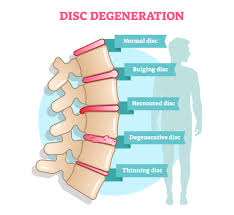What Is Spinal Degenerative Diseases?
Degenerative disk disease is when normal changes that take place in the disks of your spine cause pain.
Spinal disks are like shock absorbers between the vertebrae, or bones, of your spine. They help your back stay flexible, so you can bend and twist. As you get older, they can show signs of wear and tear. They begin to break down and may not work as well.
Nearly everyone’s disks break down over time, but not everyone feels pain. If worn-out spinal disks are the reason you’re hurting, you have degenerative disk disease.
What Are the Symptoms?
You’ll probably feel a sharp or constant pain in your back and neck. Your exact symptoms depend on where the weak disk is and other changes it has caused.
Common signs include pain that:
*. Is in your lower back, buttocks, or upper thighs
*. Comes and goes. It can be nagging or severe, and can last from a few days to a few months.
*. Feels worse when you sit, and better when you move and walk
*. Feels worse when you bend, lift, or twist
*. Gets better when you change positions or lie down
In some cases, degenerative disk disease can lead to numbness and tingling in your arms and legs. It can also cause your leg muscles to become weak. This means the damaged disks may be affecting the nerves near your spine.

